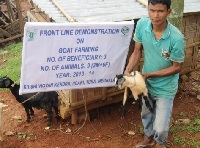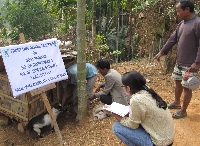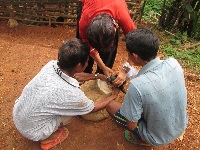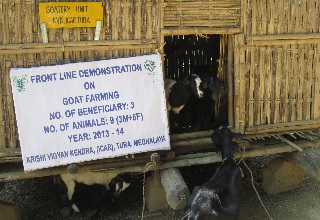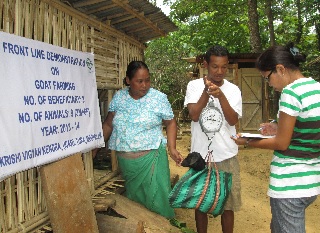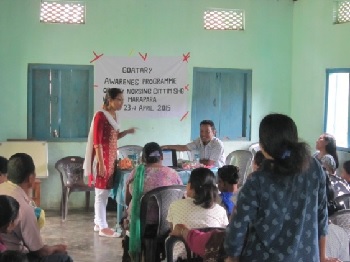Success story on “Small Scale goat rearing”
Sagarika Borah, Tanmay Samajdar, Tarun Kr Das and Greatush R. Marak ICAR, KVK, West Garo Hills, Meghalaya
Background
Goat is a very important livestock for small marginal and landless rural farmers as a source of their subsidiary income. Due to their ability to survive and produce under extreme climatic and managemental condition, goat assures income to rural farmers with almost zero input cost. A good population of non descript local goats is present in this region. But due to the poor performance of non descript local goats, the income from the goat production is not to the tune it ought to be.
In NE region goat is mainly reared for meat purpose. Although goat meat rank 4th in preference among tribal population (first three being pork, chicken and beef) in the region, it is first in preference among the non- tribal population which also constitute a sizable population and therefore its production needs to be supported through introduction of good quality goat breed. Black Bengal is a famous breed known for high prolificacy, superior meat quality, best quality skin, early sexual maturity, low kidding interval and very good adaptability.
KVK intervention
Nine Black Bengal kids (3 males and 6 females) were provided to 3 selected farmers (1 male and 2 female goats to each farmer) of West Garo Hills under Front Line Demonstration of KVK in the year 2013. Those beneficiaries acquired knowledge about managemental aspects of goat farming from the training conducted by KVK and were supported for deworming, vaccination and treatment from time to time. Goats were reared totally on grasses, shrubs and various trees leaves available in Garo Hills without any supplement feed. Goat houses were constructed with locally available materials. The performance of Black Bengal goats in the villages was recorded. The average age at first kidding for Black Bengal and local was found to be 12.8 months and 17.6 months respectively. There was three kidding in two years with average 2 kids per kidding. Gestation period was found to be 147 ±2 days in comparison with 150±2 days in local goats. Average interkidding interval was found to be 215±5days.
Success of Nambe Marak
Nambe Marak, among the three beneficiaries was immensely benefited from goat production. Nambe Marak is 27years old farmer from Kemagre village under Rongram block of West Garo Hills of Meghalaya. He has 3 bigha agricultural land as only source of his livelihood. Kemagre village is situated at elevation of 413 msl which is full of grasses, shrubs and various trees. So, he could manage to rear the goats without any commercial feed and number of goats increased up to 14 in two and half years. Nambe reported to KVK that he could save his wife by those goats only. Once his wife was hospitalised and he sold two male goats @Rs2000/- per goat and managed the expenditure. Nambe is now happy that he started to rear goats with the help of KVK and getting money from it without much investment.
Nambe Marak with his goats Weighing and Deworming in goats
Success of Pronilla Sangma
Pronilla Sangma, an existing beneficiary of KVK is also benefited by rearing Black Bengal goats. Pronilla Sangma is 47 years old progressive farmer from Marapara village under Dalu block of Meghalaya. Her main income source is paddy and vegetables. Before intervention of KVK, she was rearing only one local female goat. Pronilla was motivated to rear Black Bengal goats on small scale to get extra income. She sold her local female goat and reared three Black Bengal goats given by KVK. After then her number of goats increased to 13 in two and half years. She already earned Rs 9000/- by selling of goats. She told that it was easy to rear goats in comparison to other livestock. She is happy that she is earning extra income with almost zero input cost.
Pronilla Sangma’s goatery unit Weighing the goats Impact
Other farmers were motivated by the success of Nambe Marak and Pronilla Sangma. Both Nambe and Pronilla leased out their goats to their neighbours. In 2014 two farmers from Marapara village purchased two kids each (1male and 1 female) from KVK’s demonstration unit for rearing purpose. One SHG (Nolsing Gittim SHG) in Marapara village organized awareness cum training programme with regard to “Goat production” for the farmers of Marapara village on 23rd April 2015 with the financial support in the tune of Rs10000/- from District Planning Dept, West Garo Hills, Meghalaya. Dr. Sagarika Borah, Programme Assistant, KVK, Tura was invited as resource person.
